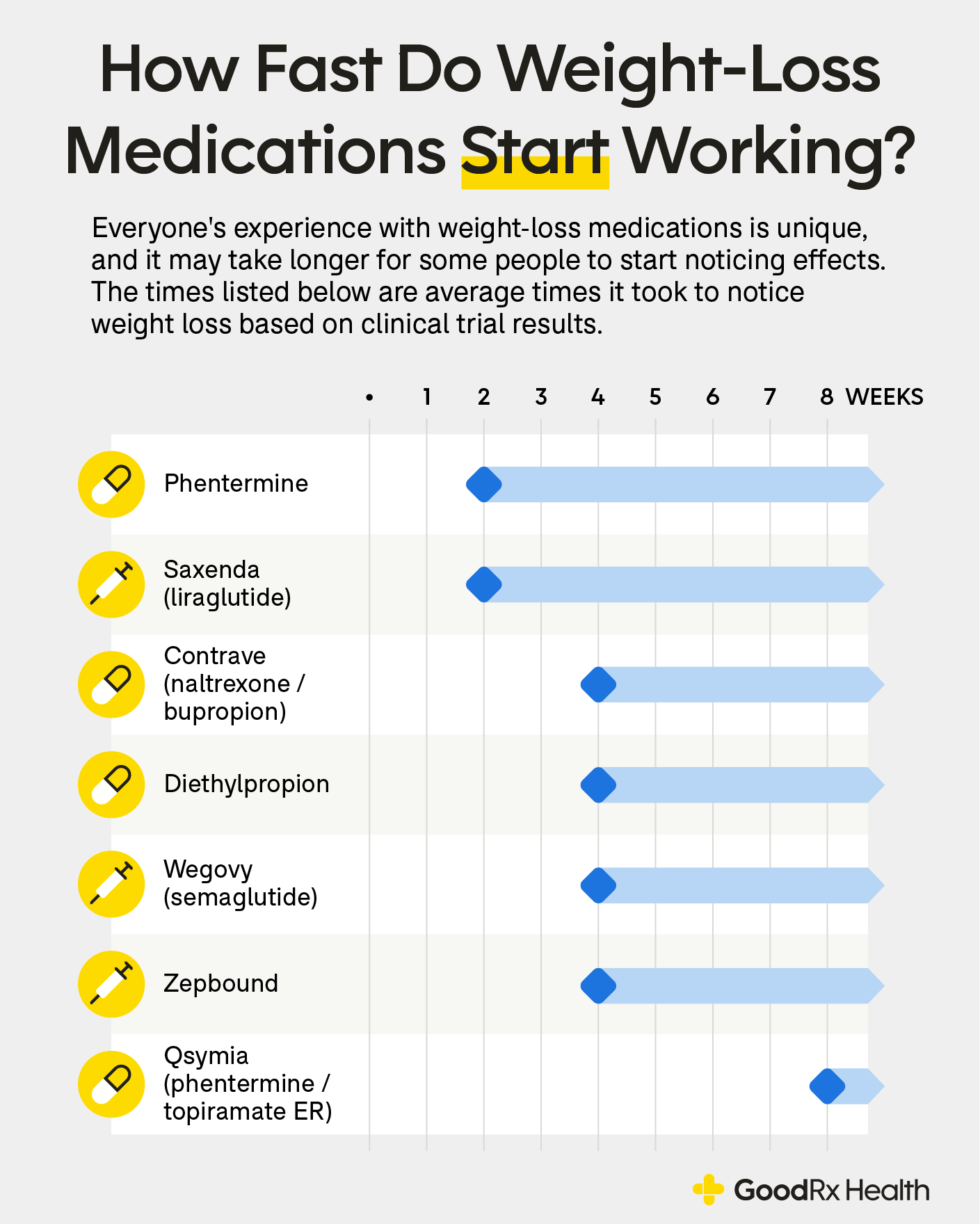Key takeaways:
Tirzepatide (Mounjaro) is FDA approved for Type 2 diabetes. People using it tend to lose weight. In November 2023, the FDA approved tirzepatide for weight loss for people with and without diabetes under the brand name Zepbound.
Currently, tirzepatide is the only medication in its class and comes as a once-weekly injection. It works by impacting your body’s insulin levels, blood glucose (sugar) production, and hunger hormones.
In clinical trials, people without diabetes lost an average of 34 lbs to 48 lbs after using the highest dose of Zepbound for 72 weeks (16.5 months).
There are ways to save on Mounjaro and Zepbound. If you’re eligible, a manufacturer savings card could help you get either for as little as $25 per prescription.
Save on related medications
Tirzepatide has been growing in popularity — and for good reason. Originally approved as Mounjaro to treat Type 2 diabetes, this injectable medication is now also available as Zepbound for weight loss. But how exactly does tirzepatide help with weight loss, and who might benefit from it?
What is tirzepatide (Mounjaro, Zepbound)?
Tirzepatide is a newer medication that was initially FDA approved in May 2022 to treat Type 2 diabetes in adults. It’s a once-weekly injection. When used along with a diabetes-friendly diet and regular exercise, it can help lower blood glucose (sugar) levels. In addition to treating Type 2 diabetes, tirzepatide is also approved for weight loss and obstructive sleep apnea (OSA) in certain adults, under the brand name Zepbound.
Can you take tirzepatide for weight loss?
Yes, tirzepatide is FDA approved for chronic weight management in adults. You may qualify for tirzepatide for weight loss if:
You are considered obese
You are considered overweight and you have one or more weight-related health conditions, such as Type 2 diabetes or high cholesterol
If you don’t meet these criteria, it’s possible a healthcare professional may still prescribe tirzepatide for weight loss. But this would be considered an off-label use of the medication. Your healthcare team may also prescribe it if you have Type 2 diabetes and weight loss is part of your treatment goals. In this case, they may prescribe Mounjaro for you instead of Zepbound, since Mounjaro is FDA approved for diabetes.
How does tirzepatide cause weight loss?
Tirzepatide is thought to promote weight loss by decreasing your appetite and prolonging feelings of fullness. That’s because these effects can cause you to eat fewer calories.
Tirzepatide is unique because it’s the only currently approved medication that acts like two natural gut hormones:
Glucose-dependent insulinotropic polypeptide (GIP)
Glucagon-like peptide-1 (GLP-1)
Because of how it works, tirzepatide is known as a dual GIP / GLP-1 receptor agonist.
GIP and GLP-1 are both incretin hormones, which are hormones that are released after eating. Tirzepatide works by mimicking their effects. This includes telling the pancreas to release insulin after eating and signaling the liver to lower the amount of new sugar it’s making. These effects help lower blood sugar.
In addition to helping lower blood sugar, tirzepatide helps with weight loss in a couple ways:
It signals to the brain that you’re full — so you eat less.
It slows the movement of food through your stomach — so you feel full longer.
Compare tirzepatide injections: See what experts say about the similarities and differences between Mounjaro and Zepbound, two brand-name versions of tirzepatide.
How does tirzepatide work? Pharmacists explain the science behind how tirzepatide works for weight loss and Type 2 diabetes.
Possible side effects: Read about tirzepatide’s potential side effects — from diarrhea to hair loss — and how to manage them.
Other similar injectable weight-loss medications only mimic one incretin — GLP-1. It’s thought that because tirzepatide acts like two incretins, it can cause more weight loss than current alternatives. Researchers have studied how effective tirzepatide is for weight loss — for people with and without diabetes.
How much weight do you typically lose on tirzepatide?
While everyone’s experience is unique, many people have lost 15% or more of their starting body weight with tirzepatide.
A clinical trial of over 2,500 people without diabetes who were considered obese or overweight experienced significant weight loss in the first of tirzepatide’s weight-loss studies. Those treated with tirzepatide had an average weight loss of 15% to 21% of their starting body weight over 72 weeks (about 16.5 months). This worked out to an average weight loss of 34 lbs to 48 lbs. Those taking the placebo (an injection with no medication in it) only had an average of 3% (about 7 lbs) weight loss.
Read more like this
Explore these related articles, suggested for readers like you.
What’s more, over a third of those taking the highest tirzepatide dose (15 mg per week) lost at least 25% of their starting body weight (over 58 lbs).

What are the side effects of tirzepatide?
Like any medication, tirzepatide can cause side effects. These seem to be most bothersome when first starting it or after raising the dose. Most side effects are mild and resolve with time.
Common side effects include:
Nausea
Vomiting
Loss of appetite
Stomach pain
Upset stomach
If these side effects are severe or ongoing, discuss them with your prescriber.
What are the risks of using tirzepatide for weight loss?
There are also some potentially serious side effects that have been reported with tirzepatide. These include:
Severe allergic reaction: This can cause a rash and breathing difficulties, and requires immediate medical attention.
Pancreatitis (inflammation of the pancreas): This can cause severe stomach or back pain, vomiting, and fevers, and requires immediate medical attention.
Thyroid cancer: Your prescriber may recommend avoiding tirzepatide if you or a close family member has a history of certain types of thyroid cancer. This is due to an increased risk of thyroid C-cell tumors found in animal studies. This risk hasn’t been confirmed in humans.
Gallbladder problems: This can include gallstones.
Hypoglycemia (low blood sugar): This may be more likely to happen if you also take insulin, sulfonylureas, or glinides for Type 2 diabetes.
Tirzepatide can also interact with other medications. Make sure you review your medications with your prescriber and pharmacist.

What are the best alternatives to tirzepatide for weight loss?
If tirzepatide for weight loss isn’t right for you, the good news is that there are other medication options. The right treatment for you will depend on many factors, including your medical history, cost, and personal preferences.
Other medications that can help with weight loss include:
Semaglutide (Wegovy)
Liraglutide (Saxenda)
Orlistat (Alli, Xenical)
Naltrexone / bupropion (Contrave)
Phentermine / topiramate ER (Qsymia)
How to save on Mounjaro or Zepbound
There are ways to save on Mounjaro and Zepbound, which are only available as brand-name medications. Both Mounjaro and Zepbound have copay savings programs available from the manufacturer. If you have commercial insurance, you may be eligible to pay as little as $25 per prescription for either Mounjaro or Zepbound.
If your commercial insurance plan doesn’t cover Zepbound, you may be able to pay $650 for a 30-day supply. Lower-cost single-dose vials are also available through LillyDirect for $349 (2.5 mg) and $499 (5 mg, 7.5 mg, 10 mg, 12.5 mg and 15 mg) per month.
Frequently asked questions
Research suggests that tirzepatide may cause more weight loss than Ozempic (semaglutide). Ozempic isn’t approved for weight management, but it can cause significant weight loss as a side effect. In a head-to-head clinical trial, people using Mounjaro lost an average of 16 lbs to 25 lbs, depending on their dose. Those receiving Ozempic lost an average of 12 lbs.
Keep in mind that this study didn’t include the highest dose of Ozempic (2 mg). But individual clinical trials suggest Mounjaro likely still results in greater weight loss. A study comparing Ozempic 2 mg to placebo found that people lost an average of 15 lbs.
No, currently tirzepatide is available only as a subcutaneous (beneath-the-skin) injection. There are companies that sell compounded tirzepatide as oral or sublingual (under-the-tongue) tablets. But these dosage forms haven’t been studied or FDA reviewed for safety or effectiveness. It’s recommended for most people to stick with or switch to a brand-name version of tirzepatide (Mounjaro or Zepbound). These have been rigorously tested to make sure they work well and are safe for most people.
Generally, yes. If you stop using tirzepatide, it’s likely that you’ll regain some of the weight you lost. Tirzepatide’s effects only last as long as you use the medication. A clinical trial found that people who stopped Zepbound regained 14% of their body weight. That same study found that most people who continued using Zepbound maintained at least 80% of the weight they lost.
Research suggests that tirzepatide may cause more weight loss than Ozempic (semaglutide). Ozempic isn’t approved for weight management, but it can cause significant weight loss as a side effect. In a head-to-head clinical trial, people using Mounjaro lost an average of 16 lbs to 25 lbs, depending on their dose. Those receiving Ozempic lost an average of 12 lbs.
Keep in mind that this study didn’t include the highest dose of Ozempic (2 mg). But individual clinical trials suggest Mounjaro likely still results in greater weight loss. A study comparing Ozempic 2 mg to placebo found that people lost an average of 15 lbs.
No, currently tirzepatide is available only as a subcutaneous (beneath-the-skin) injection. There are companies that sell compounded tirzepatide as oral or sublingual (under-the-tongue) tablets. But these dosage forms haven’t been studied or FDA reviewed for safety or effectiveness. It’s recommended for most people to stick with or switch to a brand-name version of tirzepatide (Mounjaro or Zepbound). These have been rigorously tested to make sure they work well and are safe for most people.
Generally, yes. If you stop using tirzepatide, it’s likely that you’ll regain some of the weight you lost. Tirzepatide’s effects only last as long as you use the medication. A clinical trial found that people who stopped Zepbound regained 14% of their body weight. That same study found that most people who continued using Zepbound maintained at least 80% of the weight they lost.
The bottom line
Tirzepatide is a weekly injection that can help lower blood glucose (sugar) for people with Type 2 diabetes (as Mounjaro). It’s also FDA approved for chronic weight management in adults with or without diabetes (as Zepbound). Along with diet and exercise, tirzepatide can lead to significant weight loss — an average of 15% to 21% (34 lbs to 48 lbs) for people without diabetes.
Tirzepatide signals to your brain that you’re full, slows down digestion, and lowers blood sugar. It may be one of many possible weight loss options. But it may not be right for everyone. Be sure to talk with your healthcare team about which option is best for you.

Why trust our experts?



References
Aronne, L. J., et al. (2023). Continued treatment with tirzepatide for maintenance of weight reduction in adults with obesity. JAMA.
Chavda, V. P., et al. (2022). Tirzepatide, a new era of dual-targeted treatment for diabetes and obesity: A mini-review. Molecules.
Diabetes Journals. (n.d.). Use of glucose-lowering medications in the management of type 2 diabetes.
Eli Lilly and Company. (n.d.). Zepbound.
Eli Lilly and Company. (n.d.). Ways to save—regardless of your insurance status.
Eli Lilly and Company. (2023). FDA approves Lilly's Zepbound™ (tirzepatide) for chronic weight management, a powerful new option for the treatment of obesity or overweight with weight-related medical problems.
Eli Lilly and Company. (2023). Mounjaro- tirzepatide injection, solution [package insert].
Eli Lilly and Company. (2024). Zepbound (tirzepatide) injection, for subcutaneous use Zepbound [package insert].
Eli Lilly and Company. (2025). Zepbound- tirzepatide injection, solution [package insert].
Jastreboff, A. M., et al. (2022). Tirzepatide once weekly for the treatment of obesity. The New England Journal of Medicine.
Nauck, M. A., et al. (2018). Incretin hormones: Their role in health and disease. Diabetes, Obesity and Metabolism.

















